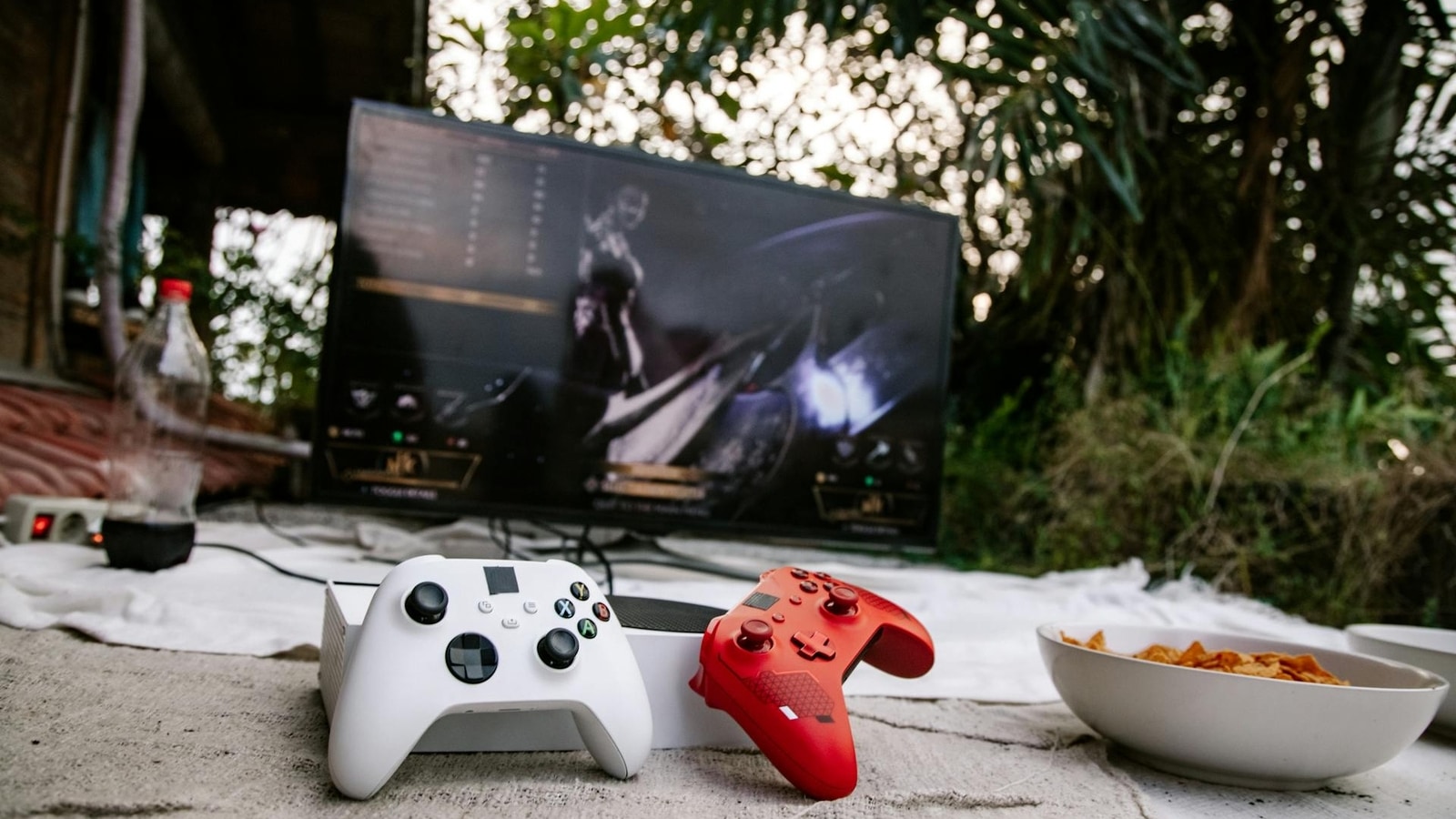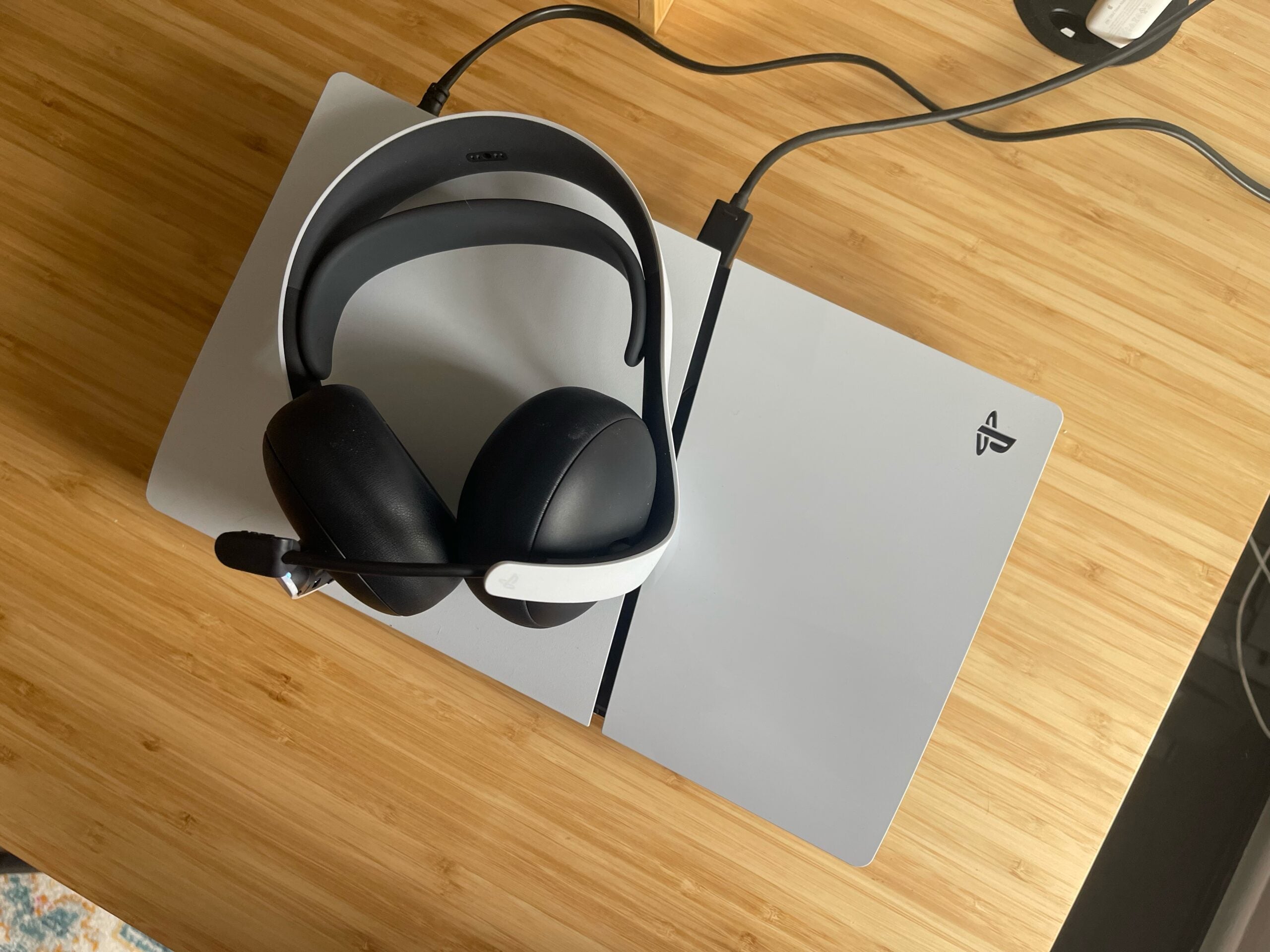Verdict
The PlayStation Pulse Elite is a triumph. Incredibly detailed and immersive audio for gaming combines with comfort and long battery life, and all at an agreeable price. The PlayStation Link enhancements feel like a genuine upgrade.
Pros
- PlayStation Link is a genuine connectivity upgrade
- Planar magnetic drivers squeezed into £130 headset
- Pillow-soft earcups are comfy and block out noise
- Long battery life
Cons
- Design won’t be for everyone
- Sub-par Bluetooth audio performance
- No ANC
Introduction
The PlayStation Pulse Elite is Sony’s latest and most advanced headset for gaming on its PS4, PS5 and Portal handheld.
The new, premium upgrade on the Pulse 3D headset offers a refined design with a retractable boom microphone boosted by AI noise reduction technology. The headset also maintains the comfortable fit from big, noise-blocking cups tailored for long sessions backed by longer battery life.
However, just like the Pulse Explore wireless earbuds, the Pulse Elite has a secret weapon. The new PlayStation Link technology aims to dramatically elevate the experience from a connectivity and audio quality standpoint.
The PlayStation Pulse Elite costs £129.99/$149.99, so is this worth the extra £30/$50 over the Pulse 3D? Here’s my verdict.
Design and Features
- PlayStation Link is a genuine breakthrough
- Wireless charging via wall hanger
- Comfortable design
Sony hasn’t strayed from convention here. With a black and white penguin-esque design that mirrors the PS5 console, it has expressive curves and isn’t afraid to take up a little room at the party.
The earcups are large and pillow-soft, while there’s a flexible comfort band beneath the head strap that’ll automatically adjust the fit, rather than having to mess with adjustable arms.
There are some key differences though. While the Pulse 3D had a pair of internal dual headphones, the PlayStation Pulse Elite has longer arms, which extend towards the wearer’s face. The left arm has a pull-out, retractable microphone boom, which should in theory offer better performance than the internal mics on the Pulse 3D.
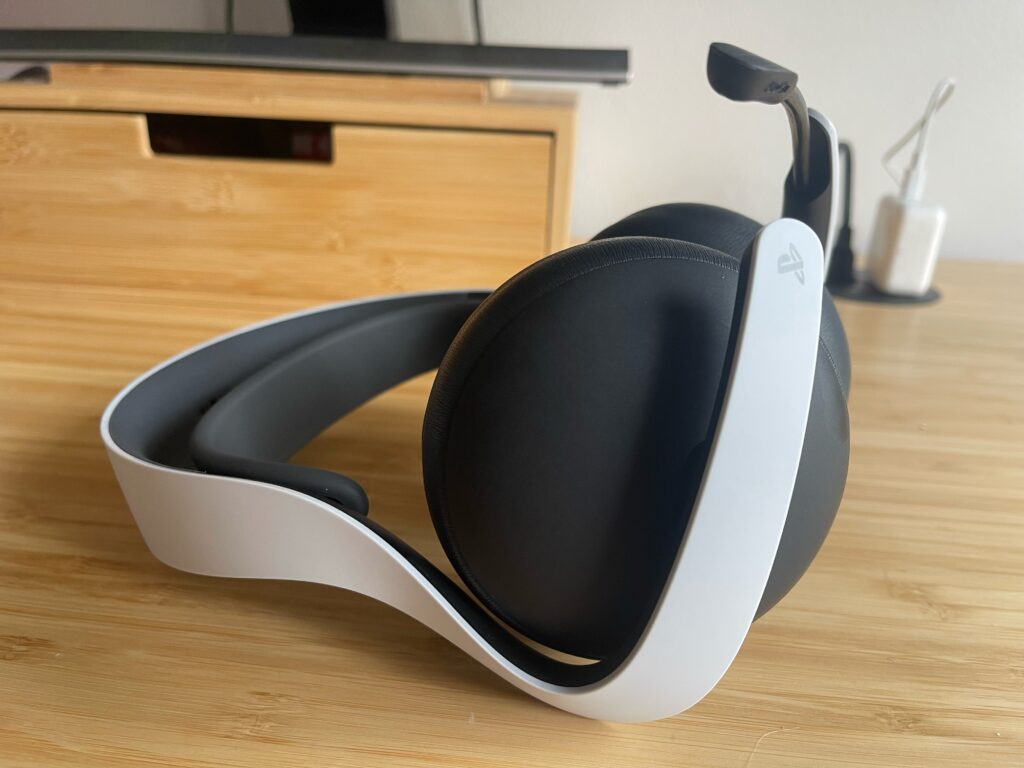
The star of the show, and a big upgrade on the Pulse 3D, is the PlayStation Link technology. The proprietary wireless tech is built into the new PlayStation Portal handset for speedy and automatic connection that doesn’t rely on Bluetooth. However, connection to PS4 and PS5 consoles (even the brand new PS5 Slim), requires an additional USB-A dongle that slides into the console. Three presses of the headset’s power/pairing button brings up a handy EQ menu for further refinement.
Sony has included a neat wall-hanging charging accessory with the PlayStation Pulse Elite wireless. The headband sits atop the charging point wirelessly, sliding into a little plastic probe rather than balancing. So, when you’re finished with your gaming session, you can just hang up the headset and it’ll be good for another 30-hour marathon next time.
That’s a nice, premium upgrade over the Pulse 3D, which relies solely on the wired USB-C charging also offered by the Elite. Many people will want to display their headset, so this is a nice touch.
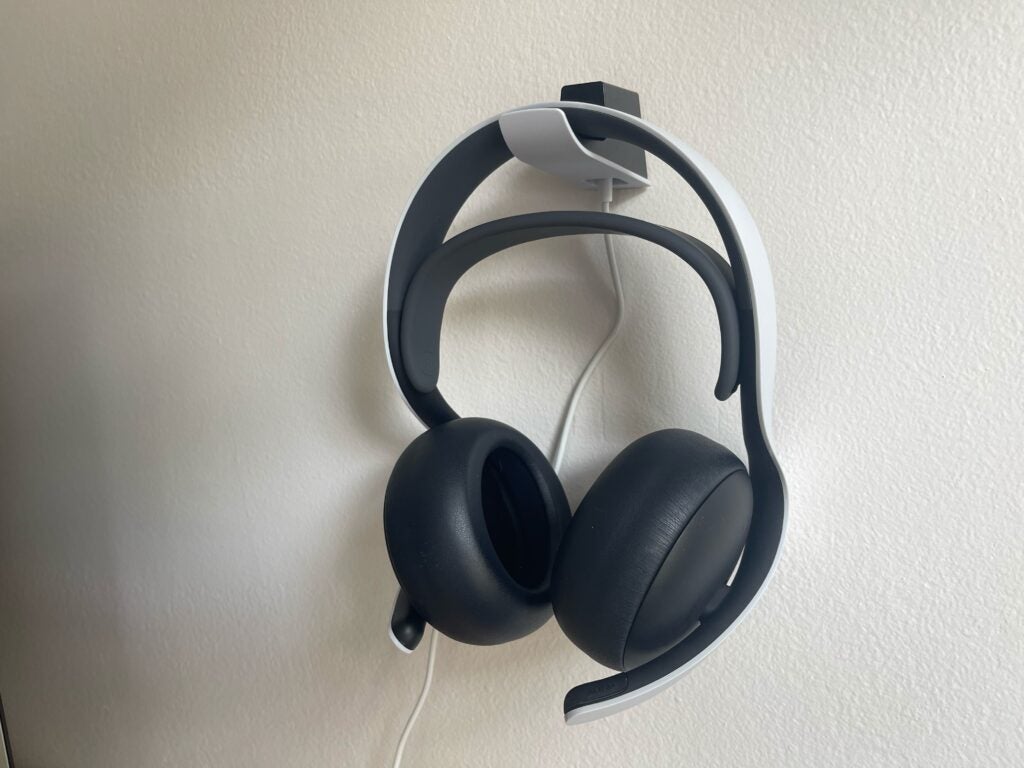
Speaking of the battery life, I charged the Pulse Elite up out of the box and then by the time I’d used them for around ten hours of gaming, music, and general messing about on the PS5, I still had more than half of the battery life left. Sony says you’ll get 30 hours overall, and just 10 minutes on the charging hanger gets you another two hours.
Audio and Microphone
- Games sound incredible via Planar Magnetic Drivers
- PlayStation Link is rapid and stable
- Music performance poor over Bluetooth
I felt the best way to test the promise of the Pulse Explore headset was with Sonic Superstars on PS5. Just kidding. I went with Marvel’s Spider-Man 2 and that incredibly cinematic opening sequence.
The initial dialogue exchanges between Miles and Peter were crisp and clear, even maintaining perfect clarity amid the chaotic din of the battle with Sandman that turns Brooklyn into a warzone. Seriously, how are there any buildings in that place?
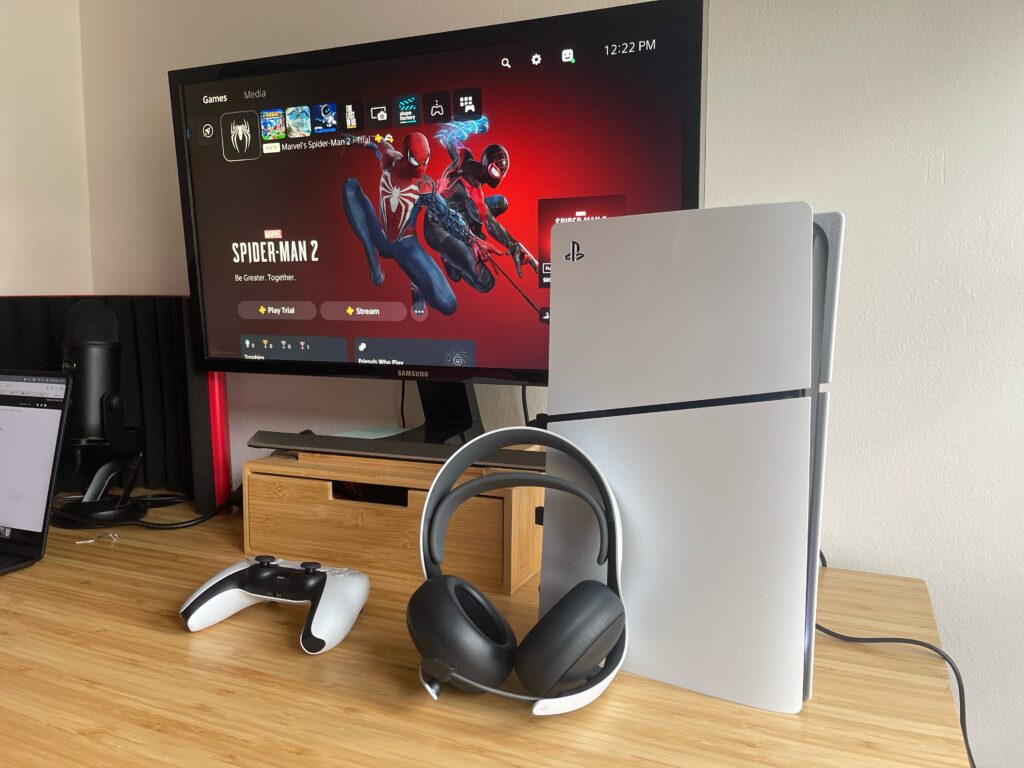
It’s a breath-taking opening to a game. Wearing the PlayStation Pulse Elite was akin to an IMAX experience with the wide, spatially aware soundscape and booming bass. Never overwhelming, but intense.
Compatibility with the PS5’s 3D Audio (available within most of the big first-party games) was a key component too, with the chaos accentuated by the sense of direction of incoming bombardments. The Pulse 3D offers this compatibility too.
The PlayStation Link connectivity really came to the fore here. As well as rapid connectivity, it enabled extremely low latency, lossless audio to be transmitted over a wireless connection, which is a big uptick in quality over a Bluetooth connection.
The speaker drivers themselves have also improved thanks to the presence of planar magnetic drivers (Pulse 3D has 40mm drivers), which are usually the reserve of higher end headphones. Sony says this tech can reproduce in-game sound with “near perfect accuracy across the entire audible spectrum.”
Sony put the tech in the Pulse Explore and has done so on the Pulse Elite too, to excellent effect.
There’s no active noise cancelling technology on either device, but this was a world of difference from the Pulse Explore wireless buds. By nature of their design, the buds allowed in a lot of ambient noise. The engulfing, pillowy-soft earcups on the Pulse Elite ensures you’re fully immersed in the action. ANC doesn’t feel necessary here and would be a drain on the battery anyway.
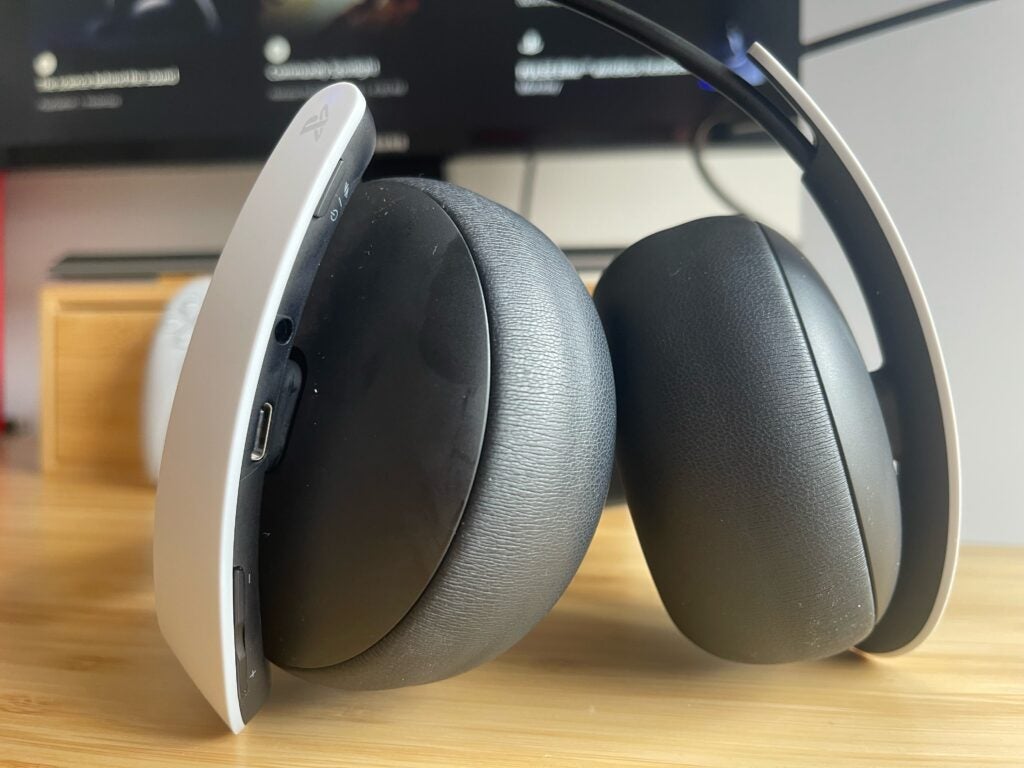
While there isn’t a 3.5mm jack, which does exist on the Pulse 3D, there is a dual-connectivity option. This allows a smartphone connection that enables you to take a call, for instance, while connected to the console via PlayStation Link. Some will be horrified by this, but others will find it useful.
I was disappointed with the music performance on a smartphone over Bluetooth. While listening on iPhone via Spotify, tracks felt tinny, distorted, and lacking detail. So if you’re mulling over a do-it-all solution for music and gaming, this probably isn’t it. Besides, the design intentionally screams “GAMER!” so it’s not necessarily the headset for a standard commuting podcast, and it doesn’t come with a case anyway.
As I pointed out in the Pulse Explore review, music performance was exponentially better over PlayStation Link, so if you love to have your tunes on in the background while you play games you won’t be disappointed here. Thanks to PlayStation Link, sound is really refined and interesting for a £129.99/$149.99 headset, provided you don’t push the volume too far.
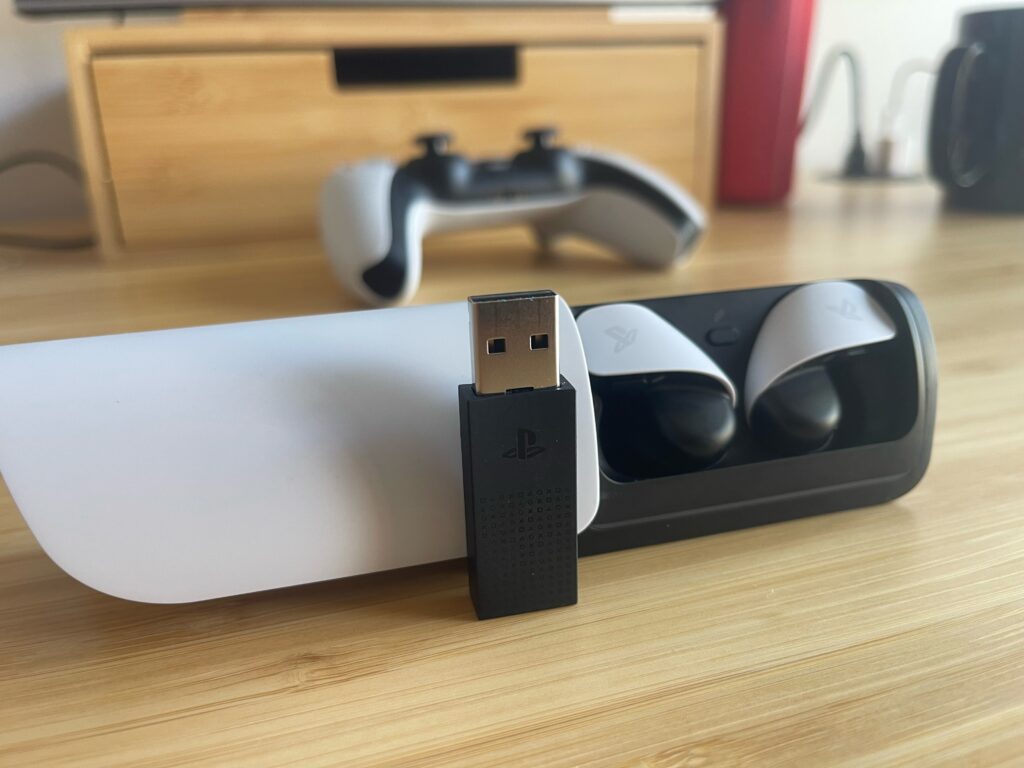
During multiplayer games and phone calls, I was assured I came through with great clarity with limited background interruptions, aided by the extendable boom microphone (that is flexible enough to align with your pie hole).
The AI reduction tech Sony speaks about does the trick, because my usually loud office (trains going by, air-con coming on randomly, neighbour kids running about the place) that often knackers my podcast recordings, didn’t affect call quality for once.
The microphone itself has the PlayStation controller button icons along the top offering an abrasive surface to pull from the holster, while the LED indicator light is a great way to check if you’re muted out of the corner of your eye.
The headset is comfortable enough to throw on during Zoom calls if you’re looking for something that’ll double up as a productivity tool. For this purpose, and Remote Play, the PlayStation Link dongle works with PC and Mac too.
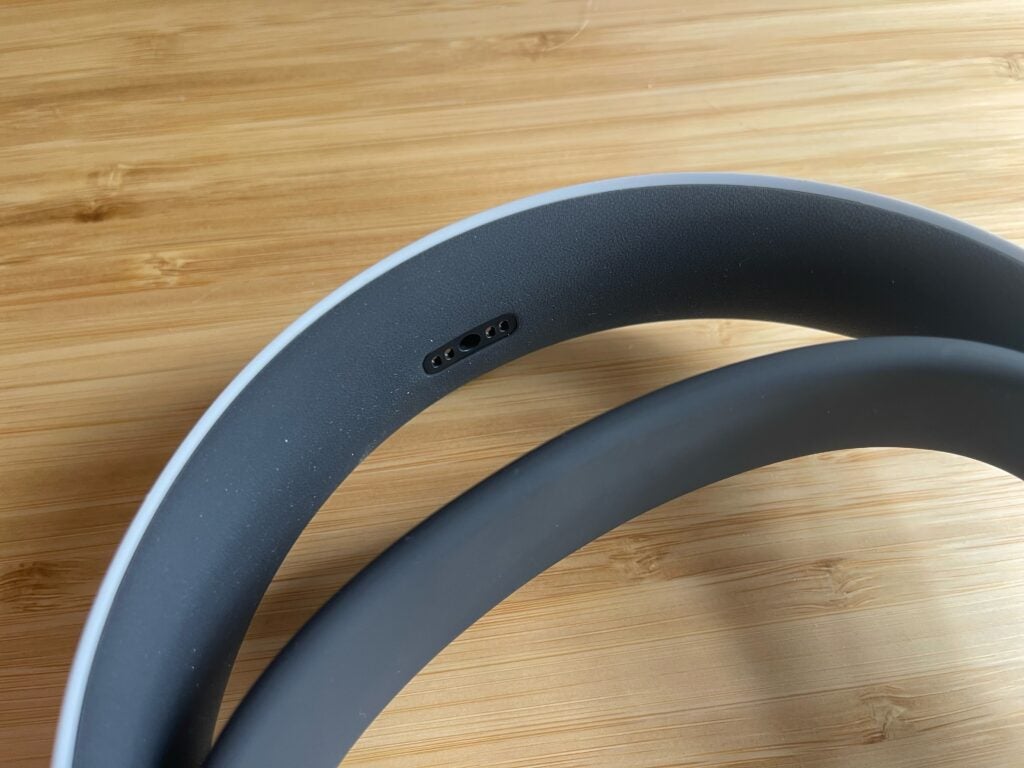
Latest deals
Should you buy it?
You want to elevate your gaming experience on PS5
PlayStation Link technology separates this headset from the pack, while the planet magnetic drivers feel like a true upgrade over predecessors at a reasonable price. It’s a tempting upgrade, even if you already own a Pulse 3D
You plan to use with PlayStation Portal
If you want the same tech in a more portable solution for use with PlayStation Portal, look at the Pulse Explore. Also, music performance suffers over Bluetooth if that’s relevant to your potential usage.
Final Thoughts
Gaming’s biggest moments feel huge in the Sony PlayStation Pulse Elite gaming headset. Sound is wonderfully immersive and encompassing, especially on games that support Sony’s 3D Audio.
The major technological enhancements deliver, with rapid connectivity to consoles over the PlayStation Link for a low latency audio experience with rapid, reliable connectivity and wireless lossless audio. The addition of Planar Magnetic Drivers also delivers a significant uptick in audio refinement and it’s commendable that Sony has squeezed the tech into a sub-£130 headset.
Designed with comfort and session longevity in mind, the Pulse Elite is a notable improvement on the Pulse 3D at a price that may just tempt you to upgrade. Check out our Best Gaming Headset and Best PS5 Headset guides for more options.
How we test
We test every set of headphones we review thoroughly over an extended period of time. We use industry-standard tests to compare features properly. We’ll always tell you what we find. We never, ever, accept money to review a product.
Find out more about how we test in our ethics policy.
FAQs
No, the technology is built into the PlayStation Portal, but the dongle is required for PS4, PS5, Mac and PC. Mobile connection is over Bluetooth.
There is no noise cancelling (active, or otherwise) on the headset, but the large earcups do a great job of shutting out background noise
Verdict
The PlayStation Pulse Elite is a triumph. Incredibly detailed and immersive audio for gaming combines with comfort and long battery life, and all at an agreeable price. The PlayStation Link enhancements feel like a genuine upgrade.
Pros
- PlayStation Link is a genuine connectivity upgrade
- Planar magnetic drivers squeezed into £130 headset
- Pillow-soft earcups are comfy and block out noise
- Long battery life
Cons
- Design won’t be for everyone
- Sub-par Bluetooth audio performance
- No ANC
Introduction
The PlayStation Pulse Elite is Sony’s latest and most advanced headset for gaming on its PS4, PS5 and Portal handheld.
The new, premium upgrade on the Pulse 3D headset offers a refined design with a retractable boom microphone boosted by AI noise reduction technology. The headset also maintains the comfortable fit from big, noise-blocking cups tailored for long sessions backed by longer battery life.
However, just like the Pulse Explore wireless earbuds, the Pulse Elite has a secret weapon. The new PlayStation Link technology aims to dramatically elevate the experience from a connectivity and audio quality standpoint.
The PlayStation Pulse Elite costs £129.99/$149.99, so is this worth the extra £30/$50 over the Pulse 3D? Here’s my verdict.
Design and Features
- PlayStation Link is a genuine breakthrough
- Wireless charging via wall hanger
- Comfortable design
Sony hasn’t strayed from convention here. With a black and white penguin-esque design that mirrors the PS5 console, it has expressive curves and isn’t afraid to take up a little room at the party.
The earcups are large and pillow-soft, while there’s a flexible comfort band beneath the head strap that’ll automatically adjust the fit, rather than having to mess with adjustable arms.
There are some key differences though. While the Pulse 3D had a pair of internal dual headphones, the PlayStation Pulse Elite has longer arms, which extend towards the wearer’s face. The left arm has a pull-out, retractable microphone boom, which should in theory offer better performance than the internal mics on the Pulse 3D.

The star of the show, and a big upgrade on the Pulse 3D, is the PlayStation Link technology. The proprietary wireless tech is built into the new PlayStation Portal handset for speedy and automatic connection that doesn’t rely on Bluetooth. However, connection to PS4 and PS5 consoles (even the brand new PS5 Slim), requires an additional USB-A dongle that slides into the console. Three presses of the headset’s power/pairing button brings up a handy EQ menu for further refinement.
Sony has included a neat wall-hanging charging accessory with the PlayStation Pulse Elite wireless. The headband sits atop the charging point wirelessly, sliding into a little plastic probe rather than balancing. So, when you’re finished with your gaming session, you can just hang up the headset and it’ll be good for another 30-hour marathon next time.
That’s a nice, premium upgrade over the Pulse 3D, which relies solely on the wired USB-C charging also offered by the Elite. Many people will want to display their headset, so this is a nice touch.

Speaking of the battery life, I charged the Pulse Elite up out of the box and then by the time I’d used them for around ten hours of gaming, music, and general messing about on the PS5, I still had more than half of the battery life left. Sony says you’ll get 30 hours overall, and just 10 minutes on the charging hanger gets you another two hours.
Audio and Microphone
- Games sound incredible via Planar Magnetic Drivers
- PlayStation Link is rapid and stable
- Music performance poor over Bluetooth
I felt the best way to test the promise of the Pulse Explore headset was with Sonic Superstars on PS5. Just kidding. I went with Marvel’s Spider-Man 2 and that incredibly cinematic opening sequence.
The initial dialogue exchanges between Miles and Peter were crisp and clear, even maintaining perfect clarity amid the chaotic din of the battle with Sandman that turns Brooklyn into a warzone. Seriously, how are there any buildings in that place?

It’s a breath-taking opening to a game. Wearing the PlayStation Pulse Elite was akin to an IMAX experience with the wide, spatially aware soundscape and booming bass. Never overwhelming, but intense.
Compatibility with the PS5’s 3D Audio (available within most of the big first-party games) was a key component too, with the chaos accentuated by the sense of direction of incoming bombardments. The Pulse 3D offers this compatibility too.
The PlayStation Link connectivity really came to the fore here. As well as rapid connectivity, it enabled extremely low latency, lossless audio to be transmitted over a wireless connection, which is a big uptick in quality over a Bluetooth connection.
The speaker drivers themselves have also improved thanks to the presence of planar magnetic drivers (Pulse 3D has 40mm drivers), which are usually the reserve of higher end headphones. Sony says this tech can reproduce in-game sound with “near perfect accuracy across the entire audible spectrum.”
Sony put the tech in the Pulse Explore and has done so on the Pulse Elite too, to excellent effect.
There’s no active noise cancelling technology on either device, but this was a world of difference from the Pulse Explore wireless buds. By nature of their design, the buds allowed in a lot of ambient noise. The engulfing, pillowy-soft earcups on the Pulse Elite ensures you’re fully immersed in the action. ANC doesn’t feel necessary here and would be a drain on the battery anyway.

While there isn’t a 3.5mm jack, which does exist on the Pulse 3D, there is a dual-connectivity option. This allows a smartphone connection that enables you to take a call, for instance, while connected to the console via PlayStation Link. Some will be horrified by this, but others will find it useful.
I was disappointed with the music performance on a smartphone over Bluetooth. While listening on iPhone via Spotify, tracks felt tinny, distorted, and lacking detail. So if you’re mulling over a do-it-all solution for music and gaming, this probably isn’t it. Besides, the design intentionally screams “GAMER!” so it’s not necessarily the headset for a standard commuting podcast, and it doesn’t come with a case anyway.
As I pointed out in the Pulse Explore review, music performance was exponentially better over PlayStation Link, so if you love to have your tunes on in the background while you play games you won’t be disappointed here. Thanks to PlayStation Link, sound is really refined and interesting for a £129.99/$149.99 headset, provided you don’t push the volume too far.

During multiplayer games and phone calls, I was assured I came through with great clarity with limited background interruptions, aided by the extendable boom microphone (that is flexible enough to align with your pie hole).
The AI reduction tech Sony speaks about does the trick, because my usually loud office (trains going by, air-con coming on randomly, neighbour kids running about the place) that often knackers my podcast recordings, didn’t affect call quality for once.
The microphone itself has the PlayStation controller button icons along the top offering an abrasive surface to pull from the holster, while the LED indicator light is a great way to check if you’re muted out of the corner of your eye.
The headset is comfortable enough to throw on during Zoom calls if you’re looking for something that’ll double up as a productivity tool. For this purpose, and Remote Play, the PlayStation Link dongle works with PC and Mac too.

Latest deals
Should you buy it?
You want to elevate your gaming experience on PS5
PlayStation Link technology separates this headset from the pack, while the planet magnetic drivers feel like a true upgrade over predecessors at a reasonable price. It’s a tempting upgrade, even if you already own a Pulse 3D
You plan to use with PlayStation Portal
If you want the same tech in a more portable solution for use with PlayStation Portal, look at the Pulse Explore. Also, music performance suffers over Bluetooth if that’s relevant to your potential usage.
Final Thoughts
Gaming’s biggest moments feel huge in the Sony PlayStation Pulse Elite gaming headset. Sound is wonderfully immersive and encompassing, especially on games that support Sony’s 3D Audio.
The major technological enhancements deliver, with rapid connectivity to consoles over the PlayStation Link for a low latency audio experience with rapid, reliable connectivity and wireless lossless audio. The addition of Planar Magnetic Drivers also delivers a significant uptick in audio refinement and it’s commendable that Sony has squeezed the tech into a sub-£130 headset.
Designed with comfort and session longevity in mind, the Pulse Elite is a notable improvement on the Pulse 3D at a price that may just tempt you to upgrade. Check out our Best Gaming Headset and Best PS5 Headset guides for more options.
How we test
We test every set of headphones we review thoroughly over an extended period of time. We use industry-standard tests to compare features properly. We’ll always tell you what we find. We never, ever, accept money to review a product.
Find out more about how we test in our ethics policy.
FAQs
No, the technology is built into the PlayStation Portal, but the dongle is required for PS4, PS5, Mac and PC. Mobile connection is over Bluetooth.
There is no noise cancelling (active, or otherwise) on the headset, but the large earcups do a great job of shutting out background noise


